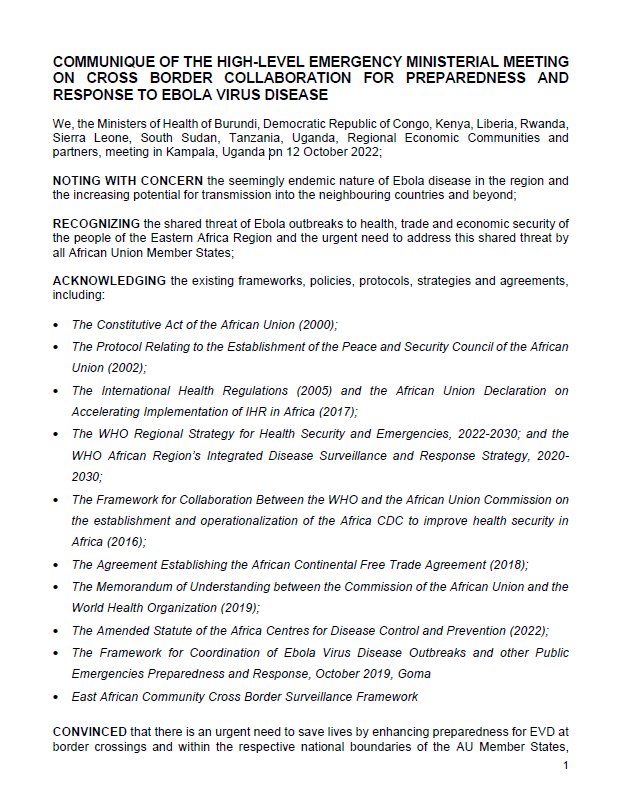We, the Ministers of Health of Burundi, Democratic Republic of Congo, Kenya, Liberia, Rwanda, Sierra Leone, South Sudan, Tanzania, Uganda, Regional Economic Communities and partners, meeting in Kampala, Uganda on 12 October 2022;
NOTING WITH CONCERN the seemingly endemic nature of Ebola disease in the region and the increasing potential for transmission into the neighbouring countries and beyond;
RECOGNIZING the shared threat of Ebola outbreaks to health, trade and economic security of the people of the Eastern Africa Region and the urgent need to address this shared threat by all African Union Member States;
ACKNOWLEDGING the existing frameworks, policies, protocols, strategies and agreements, including:
• The Constitutive Act of the African Union (2000);
• The Protocol Relating to the Establishment of the Peace and Security Council of the African Union (2002);
• The International Health Regulations (2005) and the African Union Declaration on Accelerating Implementation of IHR in Africa (2017);
• The WHO Regional Strategy for Health Security and Emergencies, 2022-2030; and the WHO African Region’s Integrated Disease Surveillance and Response Strategy, 2020-2030;
• The Framework for Collaboration Between the WHO and the African Union Commission on the establishment and operationalization of the Africa CDC to improve health security in Africa (2016);
• The Agreement Establishing the African Continental Free Trade Agreement (2018);
• The Memorandum of Understanding between the Commission of the African Union and the World Health Organization (2019);
• The Amended Statute of the Africa Centres for Disease Control and Prevention (2022);
• The Framework for Coordination of Ebola Virus Disease Outbreaks and other Public Emergencies Preparedness and Response, October 2019, Goma
• East African Community Cross Border Surveillance Framework
CONVINCED that there is an urgent need to save lives by enhancing preparedness for EVD at border crossings and within the respective national boundaries of the AU Member States, including the need for a coordinated regional and sub-regional approach to prepare and effectively respond rapidly to EVD and other similar outbreaks;
NOTING the need for robust joint monitoring of cross-border actions by Member States with the joint coordinated support of the Africa Centres for Disease Control and Prevention (Africa CDC), and the World Health Organisation; the Regional Economic Committees with other relevant partners;
COMMENDING Africa CDC, WHO, Regional Economic Communities and other partners for their support to EVD preparedness and response, including cross-border collaboration
Collectively, we resolve and commit our governments and institutions to:
1. UNDERTAKE actions to facilitate cooperation and collaboration between all African Union Member States, for EVD preparedness and response, including:
a. Cross-border EVD case and laboratory surveillance including monitoring of contacts;
b. Workforce capacity development, including joint training, exchange learning and benchmarking visits, and simulation exercises.
c. Prompt communication of epidemiological and laboratory surveillance data and other relevant reports;
d. Sharing information on potential security threats and other security issues occurring in areas affected by outbreaks;
e. Timely sharing of technical expertise and other resources and assets necessary for EVD preparedness and control;
f. Cross-border joint planning and implementation of EVD preparedness and response activities, including strengthening of capacities at the primary and community levels, risk communication and community engagement campaigns;
g. Movement of people across national borders in accordance with the International Health Regulations (2005); and
h. Legal and regulatory processes and logistics planning for rapid cross-border deployment and receipt of public health experts and medical personnel for EVD response.
i. Provision of resources to support rapid containment of EVD outbreaks in Member states
j. Building capacity for research and biomedical technologies
2. FACILITATE technical support through the WHO Country Offices and the WHO Hub in Nairobi in collaboration with the Africa CDC’s Regional Coordinating Centre in Nairobi, Kenya and the Regional Economic Communities.
3. EXCHANGE information in a timely manner on matters of common interest for preparedness and response, while acknowledging that this should be in line with the IHR (2005), so as to sustain peace, security, and prosperity of the affected Member States and the entire continent, while leveraging on existing cross border data sharing policies
4. DECIDE to establish the Africa Ebola Coordination Taskforce (AfECT), among at-risk Member States to facilitate strengthening of preparedness and response capabilities in order to mitigate the impact of EVD in Africa and beyond.
5. REQUEST the Africa CDC, the African Union Commission, and WHO to jointly assist in coordinating the Africa Ebola Coordination Task Force.
Kampala, 12th October 2022
